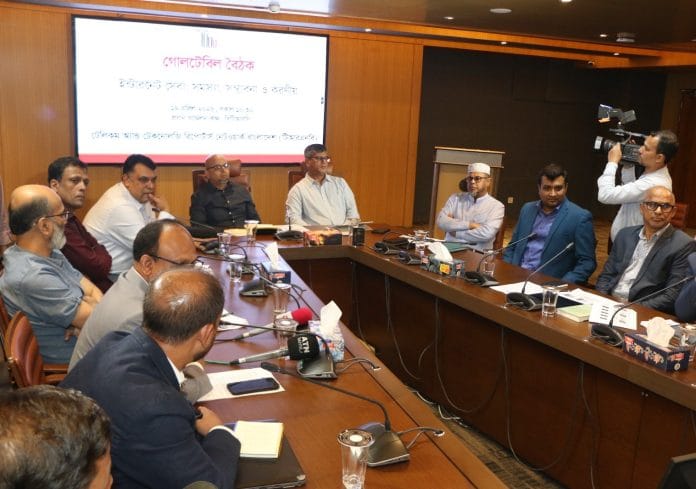Faiz Ahmad Taiyeb, Special Assistant to the Chief Adviser overseeing the Ministry of Posts, Telecommunications, and Information Technology, has urged Mobile Network Operators (MNOs), Nationwide Telecommunication Transmission Network (NTTN) providers, and Internet Service Providers (ISPs) to lower internet tariffs and improve service quality, citing affordability as a major barrier to digital inclusion in Bangladesh.
Speaking at a roundtable titled “Internet Services: Problems, Potential, and the Way Forward”—organized by the Telecom and Technology Reporters Network Bangladesh (TRNB) at the BTRC auditorium in Agargaon—Taiyeb described the current state of internet services as “substandard.”
“The quality of mobile internet in Bangladesh is among the worst globally, yet our data tariffs remain disproportionately high,” Taiyeb said. “I have recommended reducing MNO data prices, supported by comparisons with other South Asian countries such as India.”
Noting that 90% of internet users in Bangladesh rely on mobile networks, he emphasized that reducing prices while improving service would not harm the industry but rather unlock new business opportunities by expanding access.
Major Reforms Ahead
Taiyeb also announced that the government will restructure the telecom sector’s licensing and network framework by June to streamline operations and eliminate political interference. The number of licensing categories will be consolidated into three.
In a significant policy shift, he said the provision allowing internet shutdowns under the Telecommunications Act of 2001 would be removed. “We must demonstrate to the world that internet access in Bangladesh is stable and uninterrupted,” he said, noting the adverse impact of past shutdowns on freelancers and investors.
Taiyeb praised the Internet Service Providers Association of Bangladesh (ISPAB) for doubling internet speeds from 10 Mbps to 20 Mbps without raising prices, and urged consumers to ensure this initiative is being implemented uniformly. He also announced a three-year plan to relocate overhead fiber cables underground to improve both reliability and aesthetics.
Industry Voices and Demands
Echoing Taiyeb’s remarks, BTRC Chairman Major General (Retd.) Md. Emdadul Bari said upcoming telecom policies will be free from political influence. “We are reviewing the Telecommunications Act to support reduced tariffs and better services,” he added.
He also stated that fixed broadband and wireless services will be restricted to their respective domains, though business-to-business exceptions may apply. A unified ISP license will be introduced, removing the need for frequent upgrades.
ISPAB President Imdadul Haque announced the launch of a new Point of Presence (PoP) in Dhanmondi, which will enable over 6,000 users to switch ISPs in under five minutes. He also called for a 10-year license tenure and a reduction in IIG charges to Tk 120, while proposing a drop in NTTN transmission fees to Tk 5 per Mbps.
ISPAB General Secretary Nazmul Karim Bhuiyan criticized the lack of infrastructure sharing among ISPs, citing monthly losses of around Tk 100 crore due to inefficiencies.
Moinul Haque Siddiqui, Chairman of Fiber@Home, described the internet as a national “lifeline” and urged regulatory reforms to ease financial pressure on ISPs, accusing regulators of prioritizing revenue over service expansion.
Mohammad Zulfikar, Secretary General of the Association of Mobile Telecom Operators of Bangladesh (AMTOB), said mobile internet prices have dropped by 17% over the last eight months due to market competition. He advocated for a cost modeling study by BTRC to ensure sustainable pricing for MNOs and blamed stagnant user growth on the lack of quality digital content.
Telecom analyst Mustafa Mamun Hossain claimed that MNOs in Bangladesh are enjoying abnormally high profit margins. “Grameenphone’s return on equity stands at 56%, compared to the global average of 15%,” he said. “Robi also reported a significant profit last year.”
Internet and IT expert Sumon Ahmed Sabir stressed the need for long-term planning. “We must prepare now for where we want our internet infrastructure to be in three to five years,” he said, also advocating for disaster-resilient networks.
Sahed Alam, Chief Corporate and Regulatory Officer of Robi, urged support for ISPs in expanding fixed broadband, noting that it could boost investor interest.
Taimur Rahman, Chief Corporate and Regulatory Officer of Banglalink, called for better collaboration among operators to offer integrated telecom services, as seen in many countries where consumers receive a single bill for all services.
Concluding the discussion, Saifur Rahman Khan, AGM of TeleTalk, emphasized the need to expand network infrastructure to ensure improved nationwide internet services.

